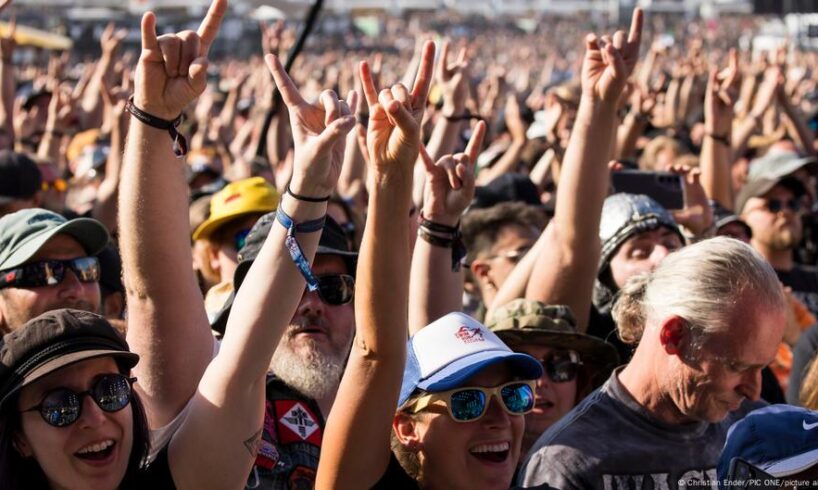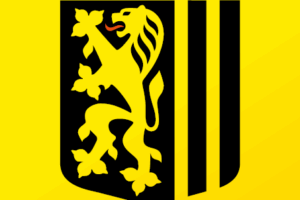
1. From provincial festival to international affair
The Wacken Open Air festival, also known as W:O:A, began in 1990 as a small festival with just 800 rock fans and a few local metal bands. The initial venue was a former gravel pit on the outskirts of the village of Wacken northwest of Hamburg. Today, the four-day event is one of the biggest and best-known metal festivals in the world, attended by around 185,000 fans from over 80 countries.
The festival usually sells out within hours, although tickets are getting more expensive — €333 this year — and the event is becoming increasingly commercialized. Nevertheless, Wacken has become a meeting place for the metal community. When in Wacken, be prepared to encounter the familiar “devils horn” metalhead salute — a raised fist with outstretched index and pinky fingers — as well as the familiar battle cry: “Wackeeeeeen!”
How Wacken became a metal mecca
To view this video please enable JavaScript, and consider upgrading to a web browser that supports HTML5 video
2. A temporary metropolis
During the festival week, the village of Wacken transforms into a metropolis of around 95,000 people, which includes fans, tens of thousands of crew members and helpers, as well as hundreds of musicians and media from all over the world. The 240-hectare site has a completely independent infrastructure with over 1,300 toilets, hundreds of showers, its own electricity and water supply, waste collection and even a small police station. There are also mobile medical stations, field kitchens, shuttle buses and a sophisticated traffic management system.
Even in heavy rain and mud — a Wacken classic — the show goes on. Tons of wood chips as a base, a drainage system and local farmers, who pull stuck vehicles out of the mud with their tractors, make the festival possible even under difficult weather conditions. But back in 2023, the mud gained the upper hand: the festival site was largely impassable, forcing around 235,000 fans to turn back. The festival was almost canceled altogether.
Metal and mud often combine at WackenImage: AP
3. A beer pipeline
Whether day or night, many metalheads traditionally maintain a steady flow of beer. To prevent the taps from running dry, an underground beer pipeline was built in 2017. It connects central tanks with several taps on the site and can transport up to 10,000 liters of beer per hour. This saves on transportation, protects the roads, and ensures supplies are uninterrupted.
Culinary offerings at the festival range from currywurst fries to vegan falafel pockets, and the food trucks can be found throughout the festival grounds. A new payment system has been in place since 2022. The festival wristband also contains a chip that can be topped up with a debit or credit card at numerous stations. This can be used to pay throughout the festival site. Cash or card payments aren’t possible.
The beer flows freely at Germany’s metal meccaImage: Daniel Reinhardt/dpapicture alliance
4. More than metal
Of course, metal takes center stage at Wacken — in all its forms. The big acts play on three main stages named “Faster,” “Harder” and “Louder.” Major acts performing this year include Guns N’ Roses, Papa Roach, Machine Head and Gojira, among others. Fans gather in front of the stages on what’s known as the Infield, also referred to as the “Holy Ground” or “Holy Field.”
But the festival also offers a variety of areas with different events and activities. In the Wackinger Village, for example, fans will find jugglers, knights, fire shows and medieval bands. The food is also a bit different here and includes hearty dishes such as suckling pig, oxen on a spit, stews and soups, as well as medieval-style desserts and drinks like mead or fruit wines.
Fans pay tribute to late heavy metal legend Ozzy Osbourne
To view this video please enable JavaScript, and consider upgrading to a web browser that supports HTML5 video
Another area known as Wasteland has a post-apocalyptic design, with flame throwers and scrap metal buildings reminiscent of “Mad Max.” A group of artists known as the “Wasteland Warriors” provides the apocalyptic flair with fire and smoke. The area also features a stage with performers playing mainly industrial music.
The Beergarden is a popular meeting place for metalheads who want to take it a little easier. Playing here is the fire department band “Wacken Firefighters,” who deliver a feel-good atmosphere with brass band versions of well-known rock classics.
Other stages also feature comedy, spoken word, metal yoga, wrestling and readings.
Fantasy and creativity are another hallmark of the music festivalImage: Axel Heimken/dpa/picture alliance
5. Metal takes a stand
Beyond all the noise, one thing is certain: Wacken sees itself not only as a festival, but also as a platform for social and culture outreach. A central element is the Wacken Foundation, which has existed since 2009. It aims to support up-and-coming bands from the metal and hard rock scene worldwide. The foundation provides financial support for studio recordings, tours and instruments. The money is donated by fans and festival operators, among others.
Of particular importance is the Wacken Metal Battle — a global competition in which young bands from over 30 countries compete against each other. Competing bands hail from far and wide, including countries such as Trinidad & Tobago and Botswana. The prize is an opportunity to play on one of the festival’s big stages. For many, it’s the first step towards an international career.
Headbanging in Botswana’s heavy metal scene
To view this video please enable JavaScript, and consider upgrading to a web browser that supports HTML5 video
The festival also hosts the Wacken Music Camp, which brings together young people from all over Germany to write, rehearse and perform their own songs. Under professional guidance, they’re provided with a creative space where they can write to their hearts’ content.
The festival also includes health-related elements, such as campaigns against blood cancer in which festival attendees are encouraged to register as potential stem cell donors. With actions like these, Wacken shows that even loud music can make a quiet statement — and that support for worthy causes is part and parcel of the metal scene.
This article was translated from German.





